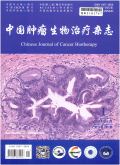中国肿瘤生物治疗杂志2024,Vol.31Issue(7):707-714,8.DOI:10.3872/j.issn.1007-385x.2024.07.010
基于生物信息学方法分析MFAP2基因在胃癌预后及免疫治疗中的意义
Bioinformatic screening reveals the significance of MFAP2 in the prognosis and immunotherapy of gastric cancer
摘要
Abstract
Objective:To screen the key genes affecting the prognosis and treatment of gastric cancer(GC)patients and to analyze the value of the key gene microfibrillar-associated protein 2(MFAP2)in suggesting the prognosis and the sensitivity of immunotherapy of GC patients.Methods:The expression profile data and clinical information of gastric cancer and paracancerous tissues were downloaded from the TCGA database.Genes significantly associated with the prognosis of gastric cancer were screened by weighted gene co-expression network analysis(WGCNA)and univariate Cox regression analysis.Multiple patient cohorts were used to assess the prognostic value of the key gene MFAP2 and analyze its efficacy and clinicopathological correlation.Multiple online databases and algorithms were used to analyze the correlation between MFAP2 and the tumor immune microenvironment.Immunophenotyping score(IPS)combined with immunotherapy patient cohort was used to analyze the value of MFAP2 in predicting the responsiveness of immunotherapy.Differential expression of MFAP2 in gastric cancer and adjacent tissues was verified with multiple datasets.Results:The blue module showed the highest correlation with survival outcomes of GC patients(R=0.17,P<0.001).Further intersections were taken with prognosis-related genes,and a total of 20 key genes were screened.High expression of the key gene MFAP2 suggested poor prognosis and pathological progression of GC(HR>1,P<0.05).MFAP2 was closely associated with cancer-associated fibroblasts,and GC patients with high expression of MFAP2 were more insensitive to immunotherapy.The high expression of MFAP2 mRNA in GC was verified by multiple datasets(P<0.05 or P<0.01).Conclusion:High expression of MFAP2 is a predictive factor for poor prognosis and response to immunotherapy in GC patients.MFAP2 is expected to serve as a novel therapeutic target and prognostic indicator for gastric cancer.关键词
胃癌/微纤维相关蛋白2/预后/肿瘤微环境/免疫治疗/生物信息学Key words
gastric cancer(GC)/microfibrillar-associated protein 2(MFAP2)/prognosis/immunotherapy/bioinformatics分类
医药卫生引用本文复制引用
张宏,黄轶华,乐湘华,刘彬,魏品球,韩钧凌,张永镇..基于生物信息学方法分析MFAP2基因在胃癌预后及免疫治疗中的意义[J].中国肿瘤生物治疗杂志,2024,31(7):707-714,8.基金项目
海南省自然科学基金青年基金(No.820QN419) (No.820QN419)

